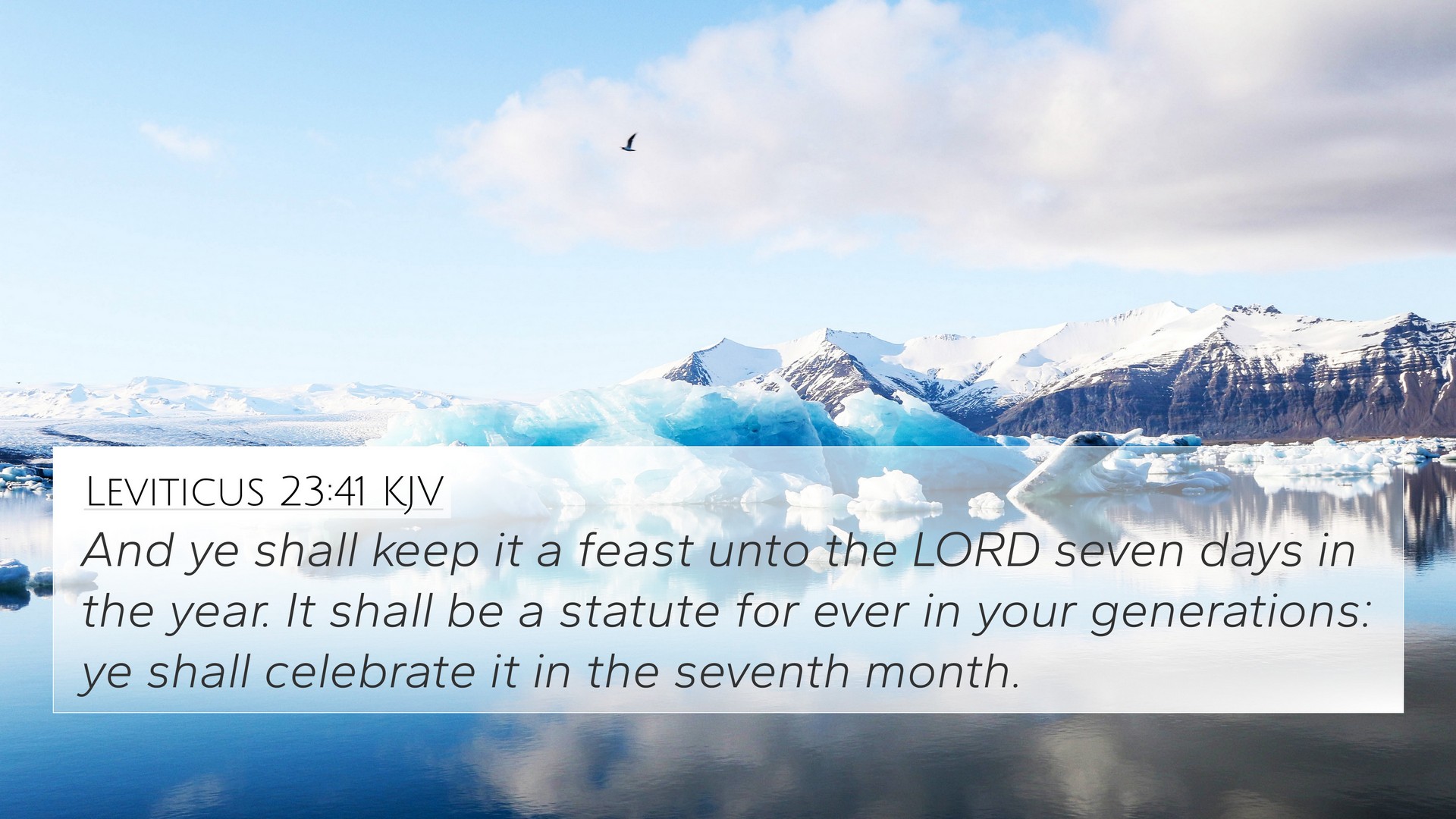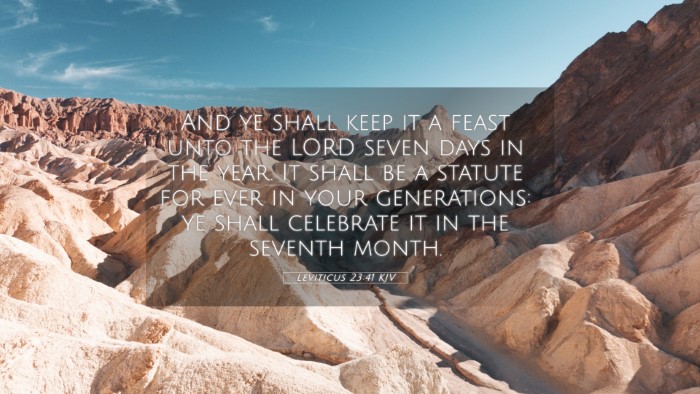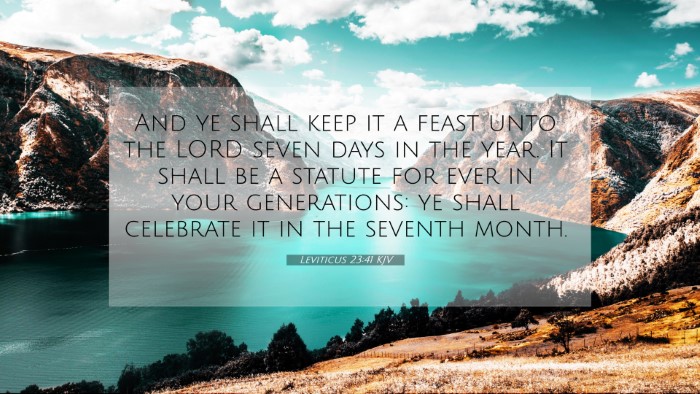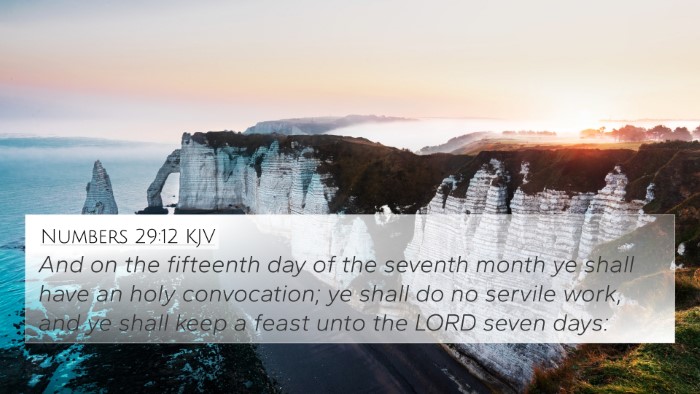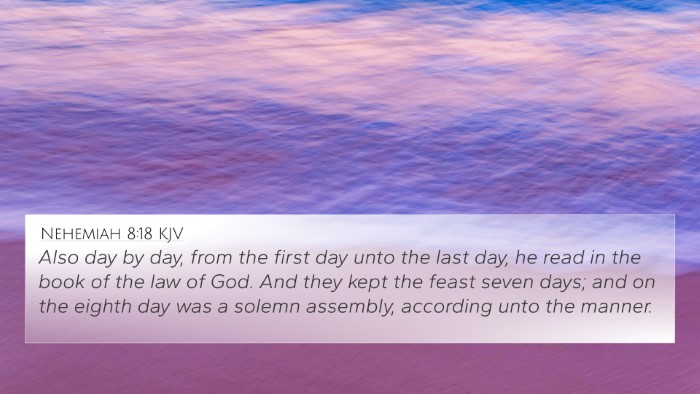Understanding Leviticus 23:41
Leviticus 23:41 states, "And ye shall keep it a feast unto the Lord seven days in the year. It shall be a statute forever in your generations: ye shall celebrate it in the seventh month." This verse relates to the observance of the Feast of Tabernacles, which is an essential festival in the Jewish calendar.
Significance of the Feast of Tabernacles
The Feast of Tabernacles, also known as Sukkot, commemorates the Israelites' exodus from Egypt and their reliance on God during their wanderings in the wilderness. The command to celebrate it with joy highlights the theological importance of remembering God’s provision and protection.
Insights from Commentaries
-
Matthew Henry:
Henry emphasizes the joy of celebration, asserting that this feast calls for a communal rejoicing in the goodness of God. The phrase "ye shall keep it a feast" points to the importance of remembrance and gratitude in the life of the believer.
-
Albert Barnes:
Barnes notes that the "seven days" reflect a period of completeness and divine perfection, symbolizing the fullness of God’s provision. He stresses that the statute is "forever," which indicates the abiding relevance of this feast through generations.
-
Adam Clarke:
Clarke provides additional depth by connecting the feast’s agricultural significance, advocating that it also celebrates the harvest, reflecting God's bounty. He points out that the festival is not just a historical event but represents ongoing spiritual truths for God’s people.
Bible Verse Cross-References
Leviticus 23:41 can be explored further through various cross-references that illuminate its themes and connections. Here are several Bible verses that relate to this one:
- Exodus 23:16: Discusses the Feast of Harvest, reinforcing the agrarian elements of the celebration.
- Deuteronomy 16:13-15: Provides instructions on celebrating the Feast of Tabernacles, emphasizing joy.
- John 7:2, 37-38: References Jesus’ observance of the feast, showing its relevance into the New Testament and the extension of its significance through Christ.
- Nehemiah 8:14-15: Highlights the revival of the feast after the Babylonian exile, indicating its enduring importance.
- Psalm 104:13-15: Reflects on God’s provision, paralleling the themes of gratitude and celebration present in Lev. 23:41.
- Zechariah 14:16-19: Prophesies about the significance of Sukkot in the millennial reign of Christ.
- Romans 15:4: Reminds the believer of the enduring value of the Scriptures, which includes the significance of the feasts.
Connections Between Bible Verses
Through these connections, one can observe how biblical themes of remembrance, celebration, and gratitude weave together across both the Old and New Testaments. The thematic Bible verse connections highlight how Leviticus 23:41 serves not only as a command but as an invitation to experience God’s provision and joy.
Tools for Bible Cross-Referencing
For further study, utilizing resources such as a Bible concordance or a cross-reference Bible study guide can be immensely helpful in exploring the connections between Bible verses. These tools assist in discerning links between scriptures and understanding the broader narrative.
Conclusion
The observance of the Feast of Tabernacles as outlined in Leviticus 23:41 holds a profound place in biblical history, theology, and the life of modern believers. By examining its Bible verse parallels and engaging with the inter-Biblical dialogue, one can appreciate the layers of meaning that this verse encapsulates.
Further Questions for Study
- What verses are related to the cultural practices surrounding the Feast of Tabernacles?
- How do Leviticus 23:41 and John 7 parallels inform Christian festival practices today?
- What roles do gratitude and celebration play within the broader context of scripture?
